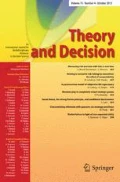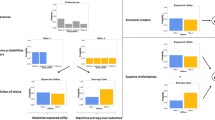Abstract
Expected utility theory does not directly deal with the utility of chance. It has been suggested in the literature (Samuelson, 1952, Markowitz, 1959) that this can be remedied by an approach which explicitly models the emotional consequences which give rise to the utility of chance. We refer to this as the elaborated outcomes approach. It is argued that the elaborated outcomes approach destroys the possibility of deriving a representation theorem based on the usual axioms of expected utility theory. This is shown with the help of an example due to Markowitz. It turns out that the space of conceivable lotteries over elaborated outcomes is too narrow to permit the application of the axioms. Moreover it is shown that a representation theorem does not hold for the example.
Similar content being viewed by others
REFERENCES
Aumann, R.J. (1997), Letter from Robert Aumann to Leonard Savage, 8 January 1971, in R.J. Aumann, Collected Papers, Vol. 1. Massachusetts Institute of Technology Press, Cambridge, Massachusetts, 305–306.
Broome, J. (1984), Rationality and the sure-thing principle, Discussion Paper 84/158, University of Bristol, Bristol, September.
Broome, J. (1986), Rationality and the sure-thing principle, paper presented to the Economics Seminar Series, Research School of Social Science, Australian National University, Canberra.
Broome, J. (1991a), Rationality and the sure-thing principle, in J. Gay Tulip Meeks (ed.), Thoughtful Economic Man, Cambridge University Press, 74–102
Broome, J. (1991b), Expected Utility and Rationality, in J. Broome, Weighing Goods, Blackwell, UK, 90–120.
Canaan, E. (1926), Profit, Palgrave's Dictionary of Political Economy, New Edition 1963, Henry Higgs (ed.), Kelley, New York.
Luce, R.D. and Raiffa, H. (1957), Games and Decisions, Wiley, New York.
Machina, M. (1989), Dynamic Consistency and Non-Expected Utility Models of Choice under Uncertainty, Journal of Economic Literature 27: 1622–68.
Markowitz, H.M. (1959), Portfolio Selection, Wiley, New York.
Marshall, A. (1920 and 1956), Principles of Economics, Macmillan, London.
Pope, R.E. (1983), The Pre-Outcome Period and the Utility of Gambling, in B.P. Stigum and F. Wenstøp (eds.), Foundations of Utility and Risk Theory with Applications, Reidel, Dordrecht, 137–177.
Pope, R.E. (1985), Timing Contradictions in von Neumann and Morgenstern's Axioms and in Savage's Sure-Thing Proof, Theory and Decision 18: 229–261.
Pope, R.E. (1988a), The Bayesian Approach: Irreconcilable with Expected Utility Theory?, in B. Munier (ed.), Risk, Decision and Rationality, Reidel, Dordrecht, 221–230.
Pope, R.E. (1988b), Reality versus Intention in the Expected Utility Procedure, Fourth International Conference on the Foundations and Applications of Utility, Risk and Decision Theory, Budapest.
Pope, R.E. (1991a), The Delusion of Certainty in Savage's Sure-Thing Principle, Journal of Economic Psychology 12(2): 209–241.
Pope, R.E. (1991b), Lowered Welfare under the Expected Utility Procedure, in A. Chikán (ed.), Progress in Decision, Utility and Risk, Kluwer, Dordrecht, 125–133.
Pope, R.E. (1996/7) and forthcoming, Debates on the Utility of Chance: A Look Back to Move Forward, Journal for Science of Research (Zeitschrift für Wissenschaftsforschung), 11/12: 43–92 to be reprinted in On the Dynamics of Modern, Complex Social and Democratic Systems, Theory and Decision Library, Series A, Kluwer Academic Publishers.
Pope, R.E. (1998), Attractions to and Repulsions from Chance, in Werner Leinfellner and Eckehart Köhler (eds.), Game Theory, Experience, Rationality, Kluwer, Dordrecht, 95–107.
Pope, R.E., forthcoming, Evidence of Deliberate Violations of Dominance due to Secondary Satisfactions – Attractions to Chance, Homo Economicus, 33pp.
Savage, L.J. (1972), Foundations of Statistics, Dover, NewYork.
Savage, L.J. (1997), Letter from Leonard Savage to Robert Aumann, 27 January 1971, in R.J. Aumann, Collected Papers, Vol. 1, Massachusetts Institute of Technology Press, Cambridge, Massachusetts, 307–310.
Samuelson, P. (1952), Probability, Utility and the Independence Axiom, Econometrica 20: 670–678.
Smith, A. (1788), The Principles which Lead and Direct Philosophical Enquiries: Illustrated by the History of Astronomy, reprinted by Liberty Press, Indianapolis, 1982.
Author information
Authors and Affiliations
Corresponding author
Rights and permissions
About this article
Cite this article
Pope, R. Reconciliation with the Utility of Chance by Elaborated Outcomes Destroys the Axiomatic Basis of Expected Utility Theory. Theory and Decision 49, 223–234 (2000). https://doi.org/10.1023/A:1026520128623
Issue Date:
DOI: https://doi.org/10.1023/A:1026520128623




